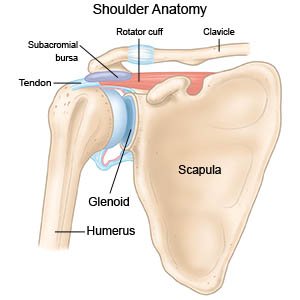Shoulder Arthroplasty
Medically reviewed by Drugs.com. Last updated on Aug 4, 2025.
What do I need to know about shoulder arthroplasty?
Shoulder arthroplasty is surgery to replace part or all of your shoulder joint. Your joint may need to be replaced because of disease or injury.
 |
How do I prepare for a shoulder arthroplasty?
- You may need to have x-rays, a CT, or an MRI before your surgery. You may need to stop taking blood thinning medicines and NSAIDs weeks before your surgery. Make arrangements for someone to drive you home when you are discharged. Ask them to stay with you for a few days after you get home.
- Your healthcare provider will tell you not to eat or drink after midnight on the day of your surgery. He or she will tell you what medicines to take or not take on the morning of surgery. You will receive IV antibiotics to help prevent an infection during your surgery.
Related medications
What will happen during a shoulder arthroplasty?
- You will be given general anesthesia to keep you asleep and pain free during your surgery. You may instead be given regional anesthesia. Regional anesthesia blocks pain in the area of your surgery, but you remain awake. It also helps to decrease pain and increase mobility after surgery. You may be given both types of anesthesia. Your anesthesiologist will discuss what anesthesia is best for you.
- Your healthcare provider will make an incision on the front of your shoulder. The head (ball) of your humerus and the glenoid fossa (socket) of your shoulder blade will be removed. A shoulder implant will replace the bones that were removed. Your healthcare provider may use medical cement to secure the implant parts. He or she may instead use an implant that has a porous surface. This surface allows your own bone to grow and fill the pores of the implant. Your healthcare provider may use both cement to hold the ball in place, and a porous socket implant.
- A drain may be placed to remove extra blood and fluids from the surgery area. Your incision will be closed with stitches, staples, or glue and covered with a bandage. A sling or splint may be placed to keep your shoulder joint from moving.
What will happen after a shoulder arthroplasty?
- You are taken to a room where your heart and breathing will be monitored. Do not get out of bed until your healthcare provider says it is okay. When healthcare providers see that you are okay, you will be taken to a hospital room. You will stay in the hospital 1 or 2 days.
- The day after surgery, a physical therapist will come to move your arm for you. You will need to go to physical therapy for several weeks after your surgery. Do not remove the sling or brace until your healthcare provider says it is okay.
What are the risks of shoulder arthroplasty?
The parts of the new joint may loosen. Your shoulder may become unstable. The bones around the parts may break. You may get an infection. The nerves, blood vessels, or muscles around your shoulder may get damaged during surgery. The ligaments and tendons around your shoulder may also get damaged. You may develop blood clots in your arm. You may not be able to lift your arm. You may need more surgeries to fix any problems.
Care Agreement
You have the right to help plan your care. Learn about your health condition and how it may be treated. Discuss treatment options with your healthcare providers to decide what care you want to receive. You always have the right to refuse treatment. The above information is an educational aid only. It is not intended as medical advice for individual conditions or treatments. Talk to your doctor, nurse or pharmacist before following any medical regimen to see if it is safe and effective for you.© Copyright Merative 2025 Information is for End User's use only and may not be sold, redistributed or otherwise used for commercial purposes.
Further information
Always consult your healthcare provider to ensure the information displayed on this page applies to your personal circumstances.
